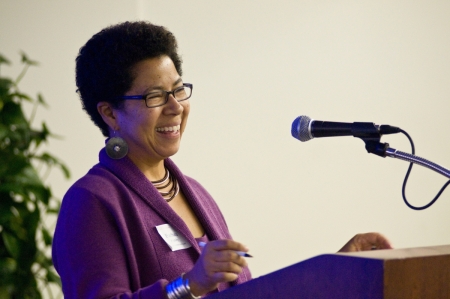Dr. Ransby is editor in chief of Souls: a critical journal of Black politics, culture and society, and serves on the editorial working group of the London-based journal, Race and Class, and the Editorial Advisory Board of the “Justice, Politics and Power” book series at University of North Carolina Press. She is also President, National Women’s Studies Association (2016 – 2018). Dr. Ransby visited us at the Marvin Center on Monday, November 19.
On Making All Black Lives Matter, from the University of California Press:
"A powerful — and personal — account of the movement and its players."—The Washington Post
“This perceptive resource on radical black liberation movements in the 21st century can inform anyone wanting to better understand . . . how to make social change.”—Publishers Weekly
The breadth and impact of Black Lives Matter in the United States has been extraordinary. Between 2012 and 2016, thousands of people marched, rallied, held vigils, and engaged in direct actions to protest and draw attention to state and vigilante violence against Black people. What began as outrage over the 2012 murder of Trayvon Martin and the exoneration of his killer, and accelerated during the Ferguson uprising of 2014, has evolved into a resurgent Black Freedom Movement, which includes a network of more than fifty organizations working together under the rubric of the Movement for Black Lives coalition. Employing a range of creative tactics and embracing group-centered leadership models, these visionary young organizers, many of them women, and many of them queer, are not only calling for an end to police violence, but demanding racial justice, gender justice, and systemic change.
In Making All Black Lives Matter, award-winning historian and longtime activist Barbara Ransby outlines the scope and genealogy of this movement, documenting its roots in Black feminist politics and situating it squarely in a Black radical tradition, one that is anticapitalist, internationalist, and focused on some of the most marginalized members of the Black community. From the perspective of a participant-observer, Ransby maps the movement, profiles many of its lesser-known leaders, measures its impact, outlines its challenges, and looks toward its future.


